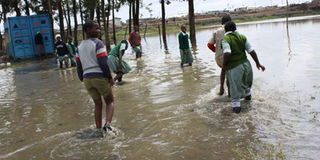It’s time we used mobile technology to save lives

Pupils try to find their way after roads were flooded in Mukuru slum. Currently, there are reported cases of people who have been swept away by floods, together with their livestock. We expect that soon water-borne diseases will spike across these areas. PHOTO | ANTHONY OMUYA | NATION MEDIA GROUP
What you need to know:
- The growth rate of the mobile market in sub-Sahara Africa is one of the highest worldwide.
- The M-Pesa platform and other mobile-based e-commerce are well advanced and almost universally available in Kenya.
The widespread availability of mobile technology is an exceptional opportunity to expand services to the population.
Mobile health, or mHealth, is the use of short messaging service (SMS), wireless data transmission, voice calling, and smartphone applications to transmit health-related information or direct care.
The growth rate of the mobile market in sub-Sahara Africa is one of the highest worldwide.
Improved network coverage, launch of 3G and 4G, together with the possibilities provided by WiFi, have increased mobile connectivity in the region.
Mobile-cellular penetration rates and growth of 3G connections are high compared with the developed world and other parts of the developing world.
ONLINE BUSINESS
The M-Pesa platform and other mobile-based e-commerce are well advanced and almost universally available in Kenya.
Indeed, Kenya has been touted as the Silicon Valley of Africa.
The country grapples with a high disease burden, of which the traditional communicable diseases are the major cause.
Kenya has some unique opportunities to use mobile technologies to meet universal health care for the population.
Mobile technologies are evolving rapidly from simple communication tools to service delivery platforms.
MOBILE HEALTH
Many pilot studies across Africa have shown that mHealth can improve and reduce the cost of patient monitoring, medication adherence, and healthcare worker communication, especially in rural areas.
Also, mHealth has shown promise in helping to standardise, store, analyse, and share patient information.
Unfortunately, many people continue to die because they do not have basic information — which can be shared via a mobile phone.
Throughout the world, mobile technologies have the potential to prevent diseases from spreading by creating awareness.
These technologies can provide online resources, information, and learning opportunities.
Messages can be localised to address immediate needs of the population, whether it is about impending floods, disease prevention methods or how to practise safe behaviours.
There are hundreds of apps and studies that have been shown to work in resource constrained settings like ours. These types of intervention have many benefits.
They help prevent diseases by sharing the right messages at the right time to the right people.
Patients do not have to make many trips to the hospital.
The patient, and by extension the family, feels empowered to manage the health condition with the tools they have at their disposal, free or at a marginal fee.
WATER-BORNE DISEASES TO SPIKE
Currently, there are reported cases of people who have been swept away by floods, together with their livestock.
We expect that soon water-borne diseases will spike across these areas.
There will not be enough health workers to attend to the patients on a timely fashion, or the patients may arrive at hospitals way too late and may be expensive to manage.
The irony is that the majority of the people involved have at least one mobile phone.
The government knows where they live.
The mobile phone companies know their actual location at any given time.
Question is, why can’t the government bring the stakeholders together and design a mechanism to routinely send text messages to people in flood-prone areas and warn them on the impending dangers?
TV and radio announcements are not enough, neither are public barazas as effective as text messages.
Is it too difficult to create and send simple messages to communities that live in areas prone to water-borne diseases and inform them, in their own language, how to avoid these diseases and what to do if they have symptoms?
Aren’t these interventions more appealing than some of the projects that county and national governments are investing in?
How is your governor using technology to make the lives of the people better, yet still being a good custodian of the limited resources?
Mr Wambugu is an informatics specialist.





